Alumni Achievement
Mary Barber, Bachelor of Science
University of Minnesota-Twin Cities alumna
Major: Animal Science, pre-vet emphasis
Minor: American Indian Studies
Class of 2013
“The actions I take and courses I make will be the footprints I leave behind—these are lifelong lessons I consider to be the best I've received in my academic career.”
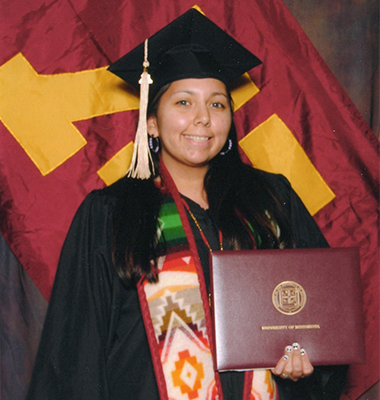
I’m an Ojibwe/Potawatomi from Wisconsin and a proud graduate of the University of Minnesota-Twin Cities. Thanks to the Department of American Indian Studies, I got the opportunity to learn more about my identity, history, culture, and language.
Furthermore, I discovered what it means to be a Native woman and my obligations to the world—I’m not just a student but a participant in the future of Mother Earth. The actions I take and courses I make will be the footprints I leave behind—these are lifelong lessons I consider to be the best I've received in my academic career.
In tandem with my animal science work, I plan to incorporate that knowledge to steer myself towards veterinary school so that I may fulfill that important task of creating a brighter future. I will be forever grateful for the wonderful faculty of the Department of American Indian Studies that helped to guide me on this wonderful path!
Ona Knoxsah, Bachelor of Arts
University of Minnesota-Twin Cities alumna
Major: American Indian studies
Class of 2009
“The gatherings hosted by the American Indian Student Cultural Center were always great because they brought so many Native students and supporters together.”
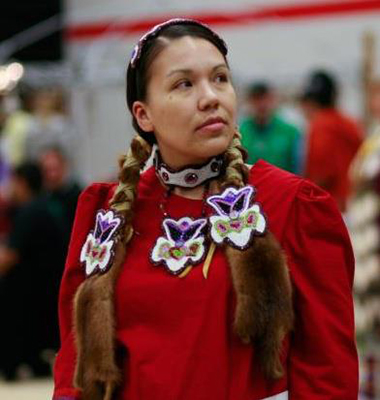
I transferred from Haskell Indian Nations University to the University of Minnesota in 2006 to study the Ojibwe language. While UM was much larger than Haskell, the American Indian Studies program was like my “family,” and the Ojibwe language classes provided my foundation.
The gatherings hosted by the American Indian Student Cultural Center were always great because they brought so many Native students and supporters together. My time at the U is well cherished. My fondest memories of course are sharing Indian Humor with other students and instructors.
Currently, I’m employed at the Native American Community Clinic as the Executive Administrative Assistant. I find this job fulfilling because everything I do benefits the Clinic, which benefits our people. Being in the position to provide for others is an honor. My goal is to help our people live healthy and fulfilling lives.
Kate Beane, PhD
University of Minnesota-Twin Cities alumna
Major: American Indian Studies
Class of 2007
"The opportunity to learn about and speak Dakota Iapi every day for three years was a true healing experience, and the knowledge and confidence that I gained in learning my language has continued to guide everything that I do as a Dakota educator."
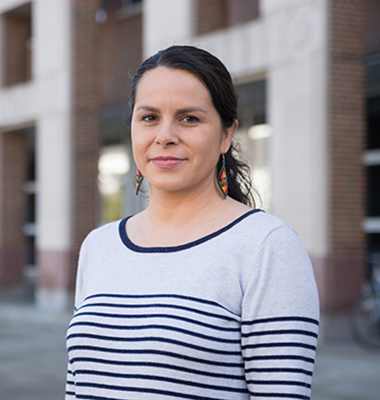
Attaining a bachelor’s degree in American Indian Studies helped me to further develop my critical thinking and writing skills to become both a historian as well as an advocate for my community. Over the years I have seen many friends, family members, and colleagues utilize this same degree major in a variety of ways: some have gone directly into the non-profit sector, and are respected leaders serving their communities, while others have gone on to graduate school to become social workers, teachers, activists, lawyers, and policy makers. My twin sister went on to law school after receiving her undergraduate degree in American Indian Studies and is now happily employed in the field of philanthropy.
Majoring in American Indian Studies provides a strong foundation from which to build upon and continue your professional and educational goals, whatever they may be. I recently completed my doctorate in American Studies, and I am now serving as a postdoctoral fellow at the University of California working on my first book manuscript for publication. But beyond my own educational and professional achievements, the most significant personal benefit that this degree program has provided for me has been the ability to focus my AIS major within the Dakota language program.
The opportunity to learn about and speak Dakota Iapi every day for three years was a true healing experience, and the knowledge and confidence that I gained in learning my language has continued to guide everything that I do as a Dakota educator. Most importantly though, it has provided me with enough proficiency to be able to pass the language on to my daughter, ensuring the continuation of our tribal language and story for future generations.
Heidi Kiiwetinepinesiik Stark, PhD
University of Minnesota-Twin Cities alumna
Major: American Indian Studies
Class of 2001
“Now that I am an Assistant Professor in the Department of Political Science at the University of Victoria teaching Indigenous politics and governance, I try to emulate the amazing professors I had during my undergraduate—who not only aided me in being a better student, but also guided me in being a better person.”
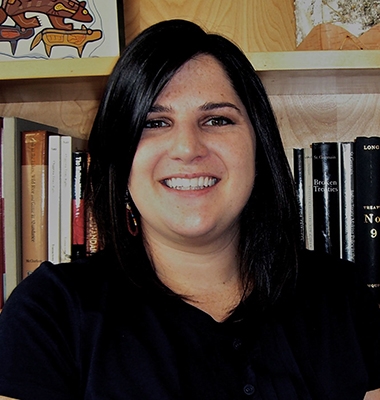
I went to the University of Minnesota because I was excited for the opportunity to earn a degree in American Indian studies and to have the chance to learn Anishinaabemowin, the Ojibwe language. I was so grateful and blessed to be able to take three years of language courses as well as etymology and literature courses that not only provided opportunities to improve my language skills but also enabled me to learn more about Anishinaabe teachings and cultural protocols.
I was also able to participate in language camps and serve on the Ojibwe Language student society. As a Turtle Mountain Anishinaabekwe, I was able to utilize my degree to learn more about Anishinaabe culture, law and politics and continue to draw on the knowledge and skills I learned as an undergraduate in my own research, writing, and teaching.
My life is richer for the amazing opportunities, experiences, and relationships formed through my undergraduate degree. In addition to Ojibwe language and culture courses, I took a number of courses focused on Indigenous politics, which sparked my own interests in research and writing. I was also able to work as an Intern with the American Indian Child Welfare Clinic and was a McNair scholar, which helped me realize I did not want to become a lawyer (though my twin sister and brother, a alumni of American Indian studies, went on to earn law degrees).
My undergraduate degree prepared me well for the work I carried out after completion, working as working as a youth worker for the Ain Dah Yung Native youth shelter in St. Paul, a youth mentor, and a doula for the American Indian Family center. I also served on the board for Nawaye Center School in Minneapolis.
My undergraduate experiences led me to study a Masters in Anishinaabe Philosophy with the Seven Generations Education Institute in Fort Frances, Canada, and I earned a PhD in American Studies at the University of Minnesota, where I was able to continue to learn from and work with the many amazing faculty in American Indian studies.
Now that I am an Assistant Professor in the Department of Political Science at the University of Victoria teaching Indigenous politics and governance, I try to emulate the amazing professors I had during my undergraduate who not only aided me in being a better student, but also guided me being a better person.
Dyllan Linehan, Bachelor of Arts
University of Minnesota-Twin Cities alumna
Major: American Indian Studies & Sociology of Law, Criminology, and Devience
Class of 2013
“I am proof that if you seek to pursue a legal or political career in Indian country, the University of Minnesota’s American Indian Studies Department is a smart place to start.”
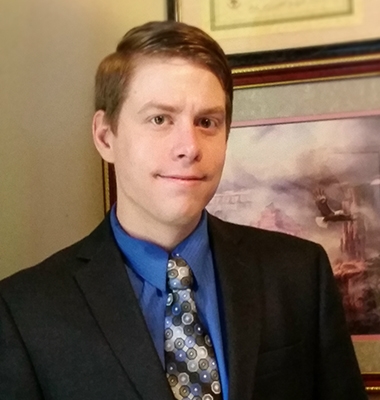
I grew up in northern Wisconsin, near several different Ojibwe reservations. My father, Gene Linehan, was a practicing attorney who worked on behalf of many of those tribes and tribal members in tribal and state court. Through him, my interest in Native culture, history, and indigenous legal systems was born.
When I enrolled as a freshman at the University of Minnesota in 2007, I knew I wanted to build upon my existing knowledge base to learn the information and skills I needed to become an effective advocate for Native Nations in the Midwest. I had no idea what a transformative experience it would be. I was lucky enough to study under legends such as David Wilkins, Brenda Child, Dennis Jones, Clint Carroll, and Jean O’Brien. I was active in the Minnesota American Indian Department and I also participated in the Center of Indigenous Nations. The classes, extracurricular activities, and connections I made as a student at the University of Minnesota solidified my desire to become a practicing attorney representing Indian tribes and their members.
Currently, I am enrolled as a second-year law student at William Mitchell College of Law in Saint Paul, Minnesota. As part of my legal studies, I am serving as a student public defender on the Menominee Indian Reservation in Wisconsin, where I appear in tribal court and represent defendants in misdemeanor cases. I have represented dozens of clients and achieved numerous acquittals and favorable judgments. I am also working on high profile federal court litigation, including a case seeking to confirm the right of Wisconsin Ojibwe tribes to hunt deer at night, as well as litigation in Wyoming over the boundaries of a tribe’s reservation.
It is amazing to be in a position to put all of the knowledge I learned as a student in the Department of American Indian Studies to work for tribes in the real world. Another positive result of my background in this area is that it has enabled me to be a leader among my peers, who recently have elected me to the position of Vice President for the Native American Law Students Association. I know that I would not be such an effective advocate in legal proceedings had I not gained the strong base of knowledge about Indian history, culture, and spirituality.
I am proof that if you seek to pursue a legal or political career in Indian country, the University of Minnesota’s Department of American Indian Studies is a smart place to start.
Sarah Shroyer
American Indian Studies alumna tells her story.
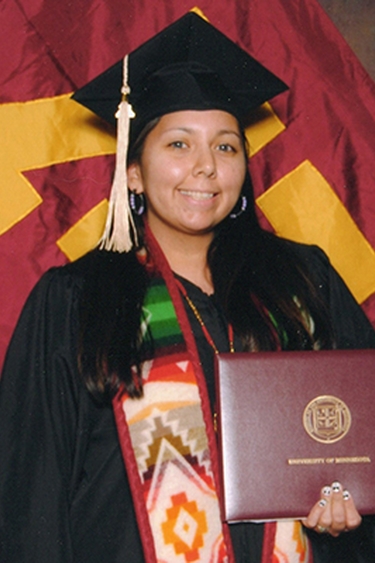
University of Minnesota-Twin Cities alumna
Major: Animal Science, pre-vet emphasis
Minor: American Indian Studies
Class of 2013
“The actions I take and courses I make will be the footprints I leave behind—these are lifelong lessons I consider to be the best I've received in my academic career.”
I’m an Ojibwe/Potawatomi from Wisconsin and a proud graduate of the University of Minnesota-Twin Cities. Thanks to the Department of American Indian Studies, I got the opportunity to learn more about my identity, history, culture, and language.
Furthermore, I discovered what it means to be a Native woman and my obligations to the world—I’m not just a student but a participant in the future of Mother Earth. The actions I take and courses I make will be the footprints I leave behind—these are lifelong lessons I consider to be the best I've received in my academic career.
In tandem with my animal science work, I plan to incorporate that knowledge to steer myself towards veterinary school so that I may fulfill that important task of creating a brighter future. I will be forever grateful for the wonderful faculty of the Department of American Indian Studies that helped to guide me on this wonderful path!